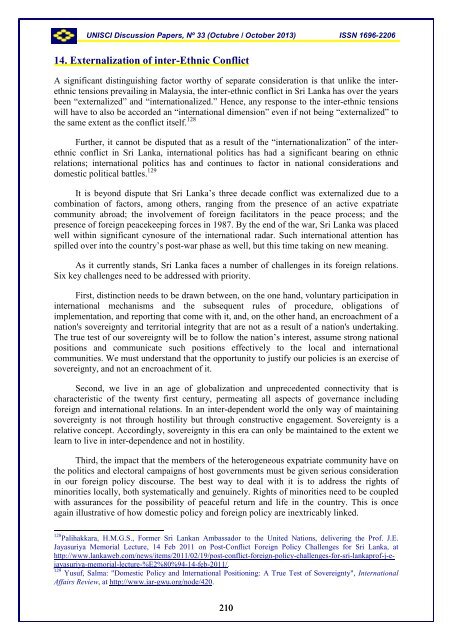UNISCI - Universidad Complutense de Madrid
UNISCI - Universidad Complutense de Madrid
UNISCI - Universidad Complutense de Madrid
Create successful ePaper yourself
Turn your PDF publications into a flip-book with our unique Google optimized e-Paper software.
<strong>UNISCI</strong> Discussion Papers, Nº 33 (Octubre / October 2013) ISSN 1696-220614. Externalization of inter-Ethnic ConflictA significant distinguishing factor worthy of separate consi<strong>de</strong>ration is that unlike the interethnictensions prevailing in Malaysia, the inter-ethnic conflict in Sri Lanka has over the yearsbeen “externalized” and “internationalized.” Hence, any response to the inter-ethnic tensionswill have to also be accor<strong>de</strong>d an “international dimension” even if not being “externalized” tothe same extent as the conflict itself. 128Further, it cannot be disputed that as a result of the “internationalization” of the interethnicconflict in Sri Lanka, international politics has had a significant bearing on ethnicrelations; international politics has and continues to factor in national consi<strong>de</strong>rations anddomestic political battles. 129It is beyond dispute that Sri Lanka’s three <strong>de</strong>ca<strong>de</strong> conflict was externalized due to acombination of factors, among others, ranging from the presence of an active expatriatecommunity abroad; the involvement of foreign facilitators in the peace process; and thepresence of foreign peacekeeping forces in 1987. By the end of the war, Sri Lanka was placedwell within significant cynosure of the international radar. Such international attention hasspilled over into the country’s post-war phase as well, but this time taking on new meaning.As it currently stands, Sri Lanka faces a number of challenges in its foreign relations.Six key challenges need to be addressed with priority.First, distinction needs to be drawn between, on the one hand, voluntary participation ininternational mechanisms and the subsequent rules of procedure, obligations ofimplementation, and reporting that come with it, and, on the other hand, an encroachment of anation's sovereignty and territorial integrity that are not as a result of a nation's un<strong>de</strong>rtaking.The true test of our sovereignty will be to follow the nation’s interest, assume strong nationalpositions and communicate such positions effectively to the local and internationalcommunities. We must un<strong>de</strong>rstand that the opportunity to justify our policies is an exercise ofsovereignty, and not an encroachment of it.Second, we live in an age of globalization and unprece<strong>de</strong>nted connectivity that ischaracteristic of the twenty first century, permeating all aspects of governance includingforeign and international relations. In an inter-<strong>de</strong>pen<strong>de</strong>nt world the only way of maintainingsovereignty is not through hostility but through constructive engagement. Sovereignty is arelative concept. Accordingly, sovereignty in this era can only be maintained to the extent welearn to live in inter-<strong>de</strong>pen<strong>de</strong>nce and not in hostility.Third, the impact that the members of the heterogeneous expatriate community have onthe politics and electoral campaigns of host governments must be given serious consi<strong>de</strong>rationin our foreign policy discourse. The best way to <strong>de</strong>al with it is to address the rights ofminorities locally, both systematically and genuinely. Rights of minorities need to be coupledwith assurances for the possibility of peaceful return and life in the country. This is onceagain illustrative of how domestic policy and foreign policy are inextricably linked.128 Palihakkara, H.M.G.S., Former Sri Lankan Ambassador to the United Nations, <strong>de</strong>livering the Prof. J.E.Jayasuriya Memorial Lecture, 14 Feb 2011 on Post-Conflict Foreign Policy Challenges for Sri Lanka, athttp://www.lankaweb.com/news/items/2011/02/19/post-conflict-foreign-policy-challenges-for-sri-lankaprof-j-ejayasuriya-memorial-lecture-%E2%80%94-14-feb-2011/.129 Yusuf, Salma: "Domestic Policy and International Positioning: A True Test of Sovereignty", InternationalAffairs Review, at http://www.iar-gwu.org/no<strong>de</strong>/420.210
















